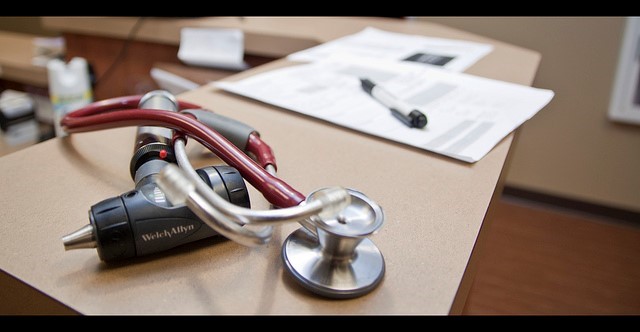Article by Dr Shane Doheny, National Assembly for Wales Research Service
The range of professions and services provided in primary care is changing. Of these professions, the role of the General Practitioner is gaining most attention. Although the GP plays a significant role in primary care, planning this workforce means thinking about more than this profession alone. If more healthcare is to be delivered in the community, then attention has to be paid to planning a broad community based workforce. Following on from the publication of the Mid Wales Healthcare Study the Minister for Health and Social Services announced an NHS workforce review, and work to develop a Primary Care Workforce Plan. This workforce plan:
[…] will tackle a number of the immediate issues faced by the primary care workforce, including what can be done to support GP recruitment and retention and the role of advanced practitioners.
[caption id="attachment_3591" align="alignright" width="300"] Image from Flickr by Connor Tarter. Licensed under Creative Commons[/caption] In early 2015 the Assembly’s Health and Social Care Committee looked into the GP workforce in Wales, making recommendations on the training, recruitment and retention of GPs, all of which were accepted by the Minister. The Health Professional Education Investment Review report called for a refreshed strategic vision for NHS Wales and called for the ‘creation of a single body to cover funding, commissioning and equity of education and training provision’. This review recognised the complexities we face in planning the workforce of the future. While welcoming the report, the Minister opened its findings for broader review. So what do we know about the workforce needs of the primary care providers of the future? What is workforce planning? Workforce planning is about trying to anticipate the shape and structure of the NHS of the future. It is about identifying the oncoming pressures on NHS services, and planning how the workforce can respond to these changes. The Centre for Workforce Intelligence (CfWI) in England has developed a Robust Workforce Planning Framework. This framework involves identifying the changes that are likely to shape services in the future, and thinking through how these changes will affect the organisation by considering different scenarios. CfWI then recommend modelling workforce demand and supply across the different scenarios and analysing the impact that policy decisions may have on these scenarios. Workforce planning is a core part of the Welsh Government’s NHS strategy, for which NHS Wales has developed various tools and resources, which draws on the work of various organisations including the CfWI. The future of General Practice According to the Royal College of General Practitioners, the NHS of 2022 ‘will require a greater number and diversity of skilled, generalist-trained professionals, able to care for patients in their homes and communities, both in and out of hours’. The Royal College believes that in the NHS of 2022, GPs will:
Image from Flickr by Connor Tarter. Licensed under Creative Commons[/caption] In early 2015 the Assembly’s Health and Social Care Committee looked into the GP workforce in Wales, making recommendations on the training, recruitment and retention of GPs, all of which were accepted by the Minister. The Health Professional Education Investment Review report called for a refreshed strategic vision for NHS Wales and called for the ‘creation of a single body to cover funding, commissioning and equity of education and training provision’. This review recognised the complexities we face in planning the workforce of the future. While welcoming the report, the Minister opened its findings for broader review. So what do we know about the workforce needs of the primary care providers of the future? What is workforce planning? Workforce planning is about trying to anticipate the shape and structure of the NHS of the future. It is about identifying the oncoming pressures on NHS services, and planning how the workforce can respond to these changes. The Centre for Workforce Intelligence (CfWI) in England has developed a Robust Workforce Planning Framework. This framework involves identifying the changes that are likely to shape services in the future, and thinking through how these changes will affect the organisation by considering different scenarios. CfWI then recommend modelling workforce demand and supply across the different scenarios and analysing the impact that policy decisions may have on these scenarios. Workforce planning is a core part of the Welsh Government’s NHS strategy, for which NHS Wales has developed various tools and resources, which draws on the work of various organisations including the CfWI. The future of General Practice According to the Royal College of General Practitioners, the NHS of 2022 ‘will require a greater number and diversity of skilled, generalist-trained professionals, able to care for patients in their homes and communities, both in and out of hours’. The Royal College believes that in the NHS of 2022, GPs will:
- Remain central, but within the context of changing population need. GPs will play a greater role in disease prevention, tackling health inequalities, and developing community resilience.
- Need ‘expert generalist skills’ to manage patients with chronic conditions. GPs will be better placed ‘to structure care plans that consider both individual conditions and multimorbidity’.
- Spend more time coordinating complex care by leading multidisciplinary teams.
- Develop a better understanding of their practice population so they will be better able to plan their workforce and improve service quality.
- Develop additional skills for extended roles in areas of work that require a generalist approach, and will work with other professionals who have ‘enhanced generalist training’.
All of this involves the GP working in a primary care system that engages more with the community and treats an expanded population of older people suffering with chronic conditions. The Nuffield Trust published a report examining how primary care practices are changing to deal with the pressures on the NHS. The report confirmed the importance of extending the scope and scale of primary care, but found no reason to advocate any one model of how to do this. Plans for the primary care workforce of the future According to a NHS Wales Shared Services Partnership (NWSSP) report in January 2015, NHS Wales is facing difficulty recruiting medical and dental staff. However plans for a primary care workforce needs to include many other professions. Alongside GPs, general practices staff include practice nurses, direct patient carers, pharmacists and clerical and administration staff. Some practices include a physician associate or an occupational therapist. GPs are also expected to work with staff employed by hospitals. These include community and district nurses, midwives, health visitors, mental health teams, health promotion teams, physiotherapists, occupational therapists, and podiatrists. Social services play an active role in primary care as do the transport, care and support work provided by the third sector. The Welsh Government recognises the need to develop the existing primary care workforce to build the redesigned and integrated workforce of the future. To build this workforce, we need information on the existing workforce, and scenarios showing the service and professional needs that the primary care of the future will respond to. As the recent NWSSP report noted:
There is little central information available about the primary care workforce. […] There has been some limited work to look at the evidence base behind alternative workforce models in primary care […]. However, as this research is not extensive any conclusions must be treated with some caution.
Clearly we need to know more about how the full range of primary care professionals can address changing pressures, if we are to develop robust plans for the primary care workforce of the future.






